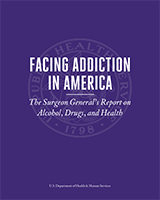From: CHAPTER 6, HEALTH CARE SYSTEMS AND SUBSTANCE USE DISORDERS

NCBI Bookshelf. A service of the National Library of Medicine, National Institutes of Health.
On July 22, 2016, President Obama signed the Comprehensive Addiction and Recovery Act (CARA), into law. CARA aims to address the national epidemic of opioid addiction by creating and expanding federal grant programs to:
These measures are important steps for reducing the impact of prescription drug misuse on America's communities by preventing and responding to opioid addiction. However, given the large number of Americans with untreated or inadequately treated opioid use disorders and the current scarcity of treatment resources, there is concern that the lack of funding for the bill will prevent this new law from having a substantial impact on the nation's ongoing opioid epidemic.
From: CHAPTER 6, HEALTH CARE SYSTEMS AND SUBSTANCE USE DISORDERS

NCBI Bookshelf. A service of the National Library of Medicine, National Institutes of Health.